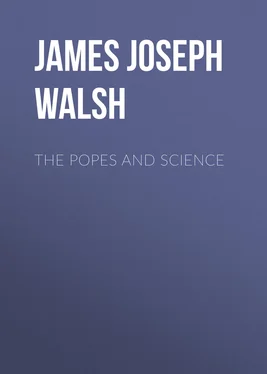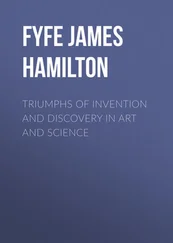James Walsh - The Popes and Science
Здесь есть возможность читать онлайн «James Walsh - The Popes and Science» — ознакомительный отрывок электронной книги совершенно бесплатно, а после прочтения отрывка купить полную версию. В некоторых случаях можно слушать аудио, скачать через торрент в формате fb2 и присутствует краткое содержание. Жанр: foreign_prose, foreign_religion, foreign_antique, на английском языке. Описание произведения, (предисловие) а так же отзывы посетителей доступны на портале библиотеки ЛибКат.
- Название:The Popes and Science
- Автор:
- Жанр:
- Год:неизвестен
- ISBN:нет данных
- Рейтинг книги:4 / 5. Голосов: 1
-
Избранное:Добавить в избранное
- Отзывы:
-
Ваша оценка:
- 80
- 1
- 2
- 3
- 4
- 5
The Popes and Science: краткое содержание, описание и аннотация
Предлагаем к чтению аннотацию, описание, краткое содержание или предисловие (зависит от того, что написал сам автор книги «The Popes and Science»). Если вы не нашли необходимую информацию о книге — напишите в комментариях, мы постараемся отыскать её.
The Popes and Science — читать онлайн ознакомительный отрывок
Ниже представлен текст книги, разбитый по страницам. Система сохранения места последней прочитанной страницы, позволяет с удобством читать онлайн бесплатно книгу «The Popes and Science», без необходимости каждый раз заново искать на чём Вы остановились. Поставьте закладку, и сможете в любой момент перейти на страницу, на которой закончили чтение.
Интервал:
Закладка:
There is another document of John XXII., the bull Super Illius Specula , that has been sometimes quoted, or rather misquoted, and which indeed at first I was inclined to think was the bull referred to by Dr. Cruikshank. This second Papal document, however, was not issued until 1326. It is concerned entirely with the practice of magic. The Pope knew that many people, by pretended intercourse with the devil or with spirits of various kinds, claimed to be able to injure, to obtain precious information, to interpret the future and the past, and to clear up most of the mysteries that bother mankind. We have them still with us–the palmist, the fortune-teller, the fake-spiritist. In order to prevent such impostures, John issued a bull forbidding such practices under pain of excommunication. It is almost needless to say that this Papal document must have effected quite as much good for the people at large as did the previous one forbidding "alchemies," which must have prevented the robbing of foolish dupes who were taken with the idea that the alchemists whom they employed could make gold and silver. Of this second Papal document, this time really a bull, we shall, because President White has given it an even falser construction than the one we have just been discussing, have more to say in the next chapter.
We must return, however, to the decretal Spondent pariter, --the decree supposed to have forbidden chemistry; for as with regard to the bull of Boniface VIII., previously discussed, it seems that it is necessary not only to show that the decree was not actually intended by the Popes to prohibit chemistry, but also it will have to be made clear that it was not misinterpreted so as to hamper chemical investigation. This is indeed a very curious state of affairs in history. First, it is solemnly declared, that certain bulls and Papal documents were directed deliberately against the sciences of anatomy and chemistry by the Head of the Church, who wished to prevent the development of these sciences lest they should lessen his power over his people. Then, when it is shown that the documents in question have no such tenor, but are simple Papal regulations for the prevention of abuses which had arisen, and that they actually did accomplish much good for generations for which they were issued, the reply is not an acknowledgement of error, but an insistence on the previous declaration, somewhat in this form: "Well, the Popes may not have intended it, but these sciences, as a consequence of their decrees, did not develop, and the Popes must be considered as to blame for that." Then, instead of showing that these sciences did not develop, this part is assumed and the whole case is supposed to be proved. Could anything well be more preposterous. And this is history! Nay, it is even the history of science.
When I called attention to the fact that this decretal contained none of the things it was said to, and published the text of it, Dr. White very calmly replied: "Dr. Walsh has indeed correctly printed it, and I notice no flaw in his translation." Instead of conceding, however, that he had been mistaken, he seemed to consider it quite sufficient to add, "I have followed what I found to be the unanimous opinion of the standard historians of chemistry." He did not mention any of the historians, however. I asked him by letter to name some of the standard historians of chemistry who made this declaration, but though I received a courteous reply, it contained no names, and, indeed, avoided the question of chemistry entirely. It is not too much to expect that an historian shall quote his authorities. Dr. White seems to be above this. Some documents that he quotes are distorted, and prove on examination, as we have seen, to have quite a different meaning to that which he gives them. As might be expected, his supposed facts prove to have as little foundation. It will be remembered that he completely ignored or was ignorant of the history of anatomy. He seems to have been just as ignorant of the history of chemistry, in spite of his confident assurance in making far-reaching statements with regard to it. In order to satisfy myself, I went through all of the standard histories of chemistry in German, English and French that are available in the libraries of New York City, and I failed to find a single one of them which contains anything that might be supposed even distantly to confirm President White's assertion.
I may have missed it, and shall be glad to know if I have. I cannot do more than cite certain of them that should have it very prominently, if Dr. White's assertion is to be taken at its face value. Here are some standard historians whom I have searched in vain for the declaration that all of them should have.
Kopp, who is the German historian of chemistry, mentions the fact that there was much less cultivation of chemistry during the fourteenth century than during the thirteenth, but makes no mention of the bull of Pope John as being responsible for it. There are curious cycles of interest in particular departments of science, with intervals of comparative lack of interest that can only be explained by the diversion of human mind to other departments of study. This seems to have happened with regard to chemistry in the fourteenth century.
Hoefer, the French historian of chemistry, mentions the fact that Pope John XXII. took severe measures against the alchemists who then wandered throughout the country, seeking to enrich themselves at the expense of the credulity of the people. He evidently knew of this decree then, but he says nothing of its forbidding or being misinterpreted, so as to seem to forbid chemical investigation. Thomson, the English historian of chemistry, has no mention of any break in the development of chemical science, caused by any action of the Popes, though, to the surprise doubtless of most readers, he devotes considerable space to the history of chemical investigation during the thirteenth and fourteenth centuries. Ernst von Meyer mentions the fact that alchemy was abused by charlatans, in order to make pretended gold and silver, and notes that there was not so much interest in chemistry in the fourteenth as in the thirteenth century, but does not ascribe this fact to the bull of Pope John.
I expected at least that I should find something with regard to the question of the possible influence of the bull in Berthelot's "History of Chemistry in the Middle Ages." [Footnote 17] But though there are various historical topics treated that would seem to imply the necessity for saying something about the bull, if it had any such effect as described, yet there is no mention of it. He mentions the Franciscan alchemists of northern Italy, who lived about this time, and discusses the "Rosarium," written very probably after the date of the bull by a Franciscan monk, but there is no suggestion as to any hampering of alchemy by Papal or other ecclesiastical restrictions.
[Footnote 17: Berthelot's Histoire de la Chimie au Moyen Age. Paris, 1893.]
The French Grande Encyclopedie does not mention it, nor does a German encyclopaedia, also consulted. Even the Encyclopaedia Britannica, in its article on alchemy, makes no mention of the prohibition of alchemy by Pope John XXII., and when the Encyclopaedia Britannica does not mention any scandal with regard to the Popes, then the scandal in question must have an extremely slight or no foundation.
Of course this is what might be expected. Anyone who reads the Papal decree can see at once that it has nothing to do with, or say about, chemistry or chemical investigation. Since, however, an aspersion has been cast upon the progress of chemistry during the Middle Ages, and since it will surely be thought by many people that, if chemistry did not happen to interest mankind at that time, it must have been because the Pope was opposed to it (for such seems to be the curious chain of reasoning of certain scholars), it has seemed well to review briefly the story of chemistry during the thirteenth, fourteenth and fifteenth centuries. More will be said about it in the chapter on Science at the Medieval Universities, and here the only idea is to bring out the fact that men were interested in what we now call chemical problems; that whatever interest they had was absolutely unhampered by ecclesiastical opposition; that indeed the very men who did the best work in this line, and their work is by no means without significance in the history of science, were all clergymen; and that most of them were in high favor with the Popes, and some of them have since received the honor of being canonized as saints.
Читать дальшеИнтервал:
Закладка:
Похожие книги на «The Popes and Science»
Представляем Вашему вниманию похожие книги на «The Popes and Science» списком для выбора. Мы отобрали схожую по названию и смыслу литературу в надежде предоставить читателям больше вариантов отыскать новые, интересные, ещё непрочитанные произведения.
Обсуждение, отзывы о книге «The Popes and Science» и просто собственные мнения читателей. Оставьте ваши комментарии, напишите, что Вы думаете о произведении, его смысле или главных героях. Укажите что конкретно понравилось, а что нет, и почему Вы так считаете.












